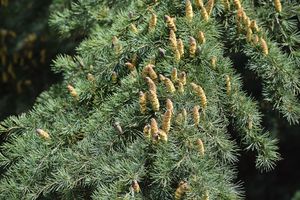Note: This is a project under development. The articles on this wiki are just being initiated and broadly incomplete. You can Help creating new pages.
Cedrus deodara - Devadaru
Devadaru is a very elegant ornamental tree. It is commonly found on the slopes of Western Himalayas. It is a large evergreen coniferous tree reaching 40-50 m tall. It has a conic crown with horizontal branches and drooping branchlets.
Contents
[hide]- 1 Uses
- 2 Parts Used
- 3 Chemical Composition
- 4 Common names
- 5 Properties
- 6 Habit
- 7 Identification
- 8 List of Ayurvedic medicine in which the herb is used
- 9 Where to get the saplings
- 10 Mode of Propagation
- 11 How to plant/cultivate
- 12 Commonly seen growing in areas
- 13 Photo Gallery
- 14 References
- 15 External Links
Uses
Bloating, Hiccups, Urinary tract disorders, Diabetes, Inflammation [1]
Parts Used
Bark, Heartwood, Resin, Oil, Leaves
Chemical Composition
Himalayan Cedarwood Oil contains two major sesquiterpenoids—alphaand beta-himchalenes. Presence of butyric and caproic acids is also reported.[2]
Common names
| Language | Common name |
|---|---|
| Kannada | Bhadradaaru, Daevadaaru |
| Hindi | Devdar |
| Malayalam | Devataram |
| Tamil | Devadaram, Devadaru |
| Telugu | |
| Marathi | NA |
| Gujarathi | NA |
| Punjabi | NA |
| Kashmiri | NA |
| Sanskrit | Amarataru, Badradaru |
| English | Devdar, Himalayan Cedar |
Properties
Reference: Dravya - Substance, Rasa - Taste, Guna - Qualities, Veerya - Potency, Vipaka - Post-digesion effect, Karma - Pharmacological activity, Prabhava - Therepeutics.
Dravya
Rasa
Tikta (Bitter), Katu (Pungent), Kashaya (Astringent)
Guna
Laghu (Light), Rooksha (Dry)
Veerya
Ushna (Hot)
Vipaka
Kapha, Vata
Prabhava
Habit
Identification
Leaf
| Kind | Shape | Feature |
|---|---|---|
| Needles | Needles blue-green, about 30 in a cluster, 3-5 cm long, acuminate |
Flower
| Type | Size | Color and composition | Stamen | More information |
|---|---|---|---|---|
| Unisexual | Male and female cones | Flowers appear in September and October. Cones solitary or in pairs. ovate or barrel-shaped. |
Fruit
| Type | Size | Mass | Appearance | Seeds | More information |
|---|---|---|---|---|---|
| Cone | The seed is shed from scaly cones from September to December; seed scales 5-6 cm wide, usually glabrous on the upper side. | {{{5}}} | {{{6}}} |
Other features
List of Ayurvedic medicine in which the herb is used
Where to get the saplings
Mode of Propagation
How to plant/cultivate
Seed - collect the cones in winter and keep in a warm room until they open. Sow immediately in a cold frame. [6]
Commonly seen growing in areas
Photo Gallery
References
External Links
- Ayurvedic Herbs known to be helpful to treat Bloating
- Ayurvedic Herbs known to be helpful to treat Hiccups
- Ayurvedic Herbs known to be helpful to treat Urinary tract disorders
- Ayurvedic Herbs known to be helpful to treat Diabetes
- Ayurvedic Herbs known to be helpful to treat Inflammation
- Herbs with Bark used in medicine
- Herbs with Heartwood used in medicine
- Herbs with Resin used in medicine
- Herbs with Oil used in medicine
- Herbs with Leaves used in medicine
- Herbs with common name in Kannada
- Herbs with common name in Hindi
- Herbs with common name in Malayalam
- Herbs with common name in Tamil
- Herbs with common name in Sanskrit
- Herbs with common name in English
- Habit - Tree
- Index of Plants which can be propagated by Seeds
- Herbs that are commonly seen in the region of Temperate area
- Herbs that are commonly seen in the region of Himalayas
- Herbs
- Himalayas
- Tree
- Ayurvedic herbs that don't have seed photos
- Pinaceae




